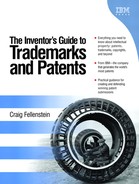Patents
Patents are different from trademarks. Patents provide protection for inventions, processes, formulas, or improvements in one of these areas. Patent protection is a right granted by a government that gives its holder the right to exclude others from making, using, or selling the patented invention “claimed” in the patent deed, provided that certain fees are paid. Part of the intent of patent provisioning laws is to give the developer of a new product or idea time to recover any necessary research and development costs, along with start-up costs, without the normal influence from competition.
Patents may not be obtained for an invention that has been publicly disclosed, is in use, or marketed in this country for more than one year before a patent application is filed. Thus, it is critical to patent an invention before disclosing or marketing it; otherwise, the possibility of obtaining a patent is quickly jeopardized.
Obtaining a patent sometimes can be time-consuming. In fact the process, which includes conducting a search and the application preparation, may take from several weeks up to a year and then another two years for approval by the U.S. Patent and Trademark Office. Patent searches are necessary because these will give the inventor a good indication as to whether the idea has already been patented. This search period will vary, depending on the country, but it will take time. The fact that the idea is not on the market does not mean that has not been patented; therefore, the need for a prior art search exists.
Patent searches can be accomplished in several ways. We discussed formalisms to this process in Chapter 3. The inventor can and should also consult a patent attorney for a legal search. These usually cost several hundred dollars but will provide the best results. The inventor also can visit the publicly available free search sites to try to identify prior art (as shown in Chapters 2 and 3). There is no charge to utilize the free public sites for this assistance, but it will take time and some computer keyword-search expertise on the part of the inventor.
Definition: Patent
pat·ent (![]() )—n.
)—n.
TA grant made by a government that confers upon the creator of an invention the sole right to make, use, and sell that invention for a set period of time.
Letters patent.
An invention protected by such a grant.
A grant made by a government that confers on an individual fee—simple title to public lands.
The official document of such a grant.
The land so granted.
An exclusive right or title.
pat·ent (![]() )—adj.
)—adj.
(also
 ) Obvious; plain.
) Obvious; plain.(
 ) Biology.
) Biology.Not blocked; open.
Spreading open; expanded.
Of, relating to, or being a nonprescription drug or other medical preparation that is often protected by a trademark.
Of high quality. Used of flour.
(also
 ) Archaic. Open to general inspection. Used especially of documents.
) Archaic. Open to general inspection. Used especially of documents.
pat·ent·ed, pat·ent·ing, pat·ents—tr.v.
